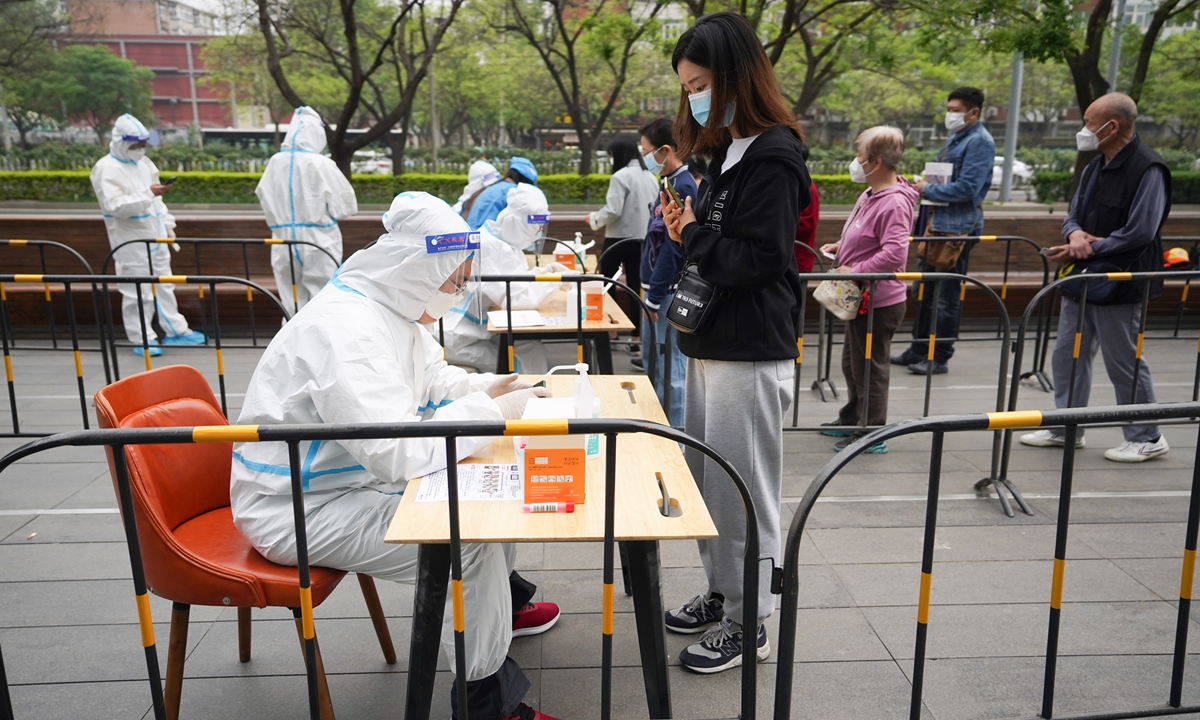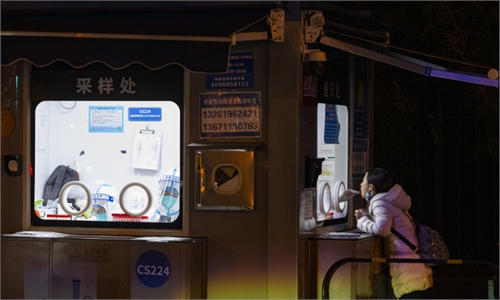
Medical workers register for local residents before nucleic acid test at a testing site in the hardest-hit Chaoyang District, Beijing, capital of China, on April 25, 2022. Photo:Xinhua News Agency
Beijing's newly reported COVID-19 infections continue to exceed 1,000 on Sunday, with the number of confirmed cases and infections found at the community level both growing rapidly and showing no signs of remission. While the city has further optimized epidemic control measures, requiring that hard enclosures are strictly prohibited from blocking fire exits, doors of buildings and neighborhoods, and limit the temporary control time to less than 24 hours.
The epidemic has spread to more parts of the city, making the epidemic prevention and control conditions more severe, local health officials said on Monday, adding that government will provide thorough services to ensure people's daily needs are met and to respond immediately to appeals related to the epidemic prevention and control.
The city is facing the most complicated and severe anti-epidemic situation since the outbreak of COVID-19 began, with more than 20,275 cases reported in the latest outbreak from November 1 to 27. More than 1,000 new infections have been reported in the city every day for six consecutive days since November 21.
On Sunday alone, Beijing reported 1,781 new confirmed cases and 1,411 asymptomatic infections, 233 of whom were found through social screening, according to local health authorities.
"The number of cases detected among communities continues to increase, and the risk of hidden transmission among communities is high," said an official from Chaoyang district, the hardest-hit area.
Starting from November 24, residents in Beijing must present a 48-hour or even a 24-hour negative nucleic acid test before entering enterprises, commercial buildings, shopping malls, hotels, restaurants, scenic spots and other public places, or when taking public transportation, according to local health authorities.
To reduce the risk of the disease spreading, health officials in Beijing have reminded residents to reduce unnecessary outings and avoid going to high-risk areas and crowded places. Authorities have also given advice on regulating the wearing of masks, maintaining safe social distancing and personal hygiene to reduce the risk of cross-infection.
At the same time, accelerating the detection and management of infections is considered a top priority to contain the rate of the spread and the rise of the epidemic in the city. Prioritizing regional nucleic acid testing and minimizing the time to report test results are considered important means to detect potential infection risks.
Other measures to rein in risks have also been strengthened, including restricting gatherings of people, conducting large-scale nucleic acid testing, implementing closed-loop management in key places such as nursing homes and enhancing disinfection in public venues.
Meanwhile, the freezing weather in the city is likely to add further uncertainty to the battle to stop the spread of the virus. Medical experts caution that the possibility of more cases in the future still exists, "The virus is only more active in weather like this, the virus will be difficult to eliminate, or at least the speed of elimination will be slowed down," Yang Zhanqiu, a professor of the pathogen biology department at Wuhan University, told the Global Times on Sunday.
Beijing officials have pledged to further improve the basic facilities of makeshift hospitals, such as water, electricity and heating, and to ensure the supply of vegetables and daily necessities in winter, on the basis of current epidemic prevention and control policies.

